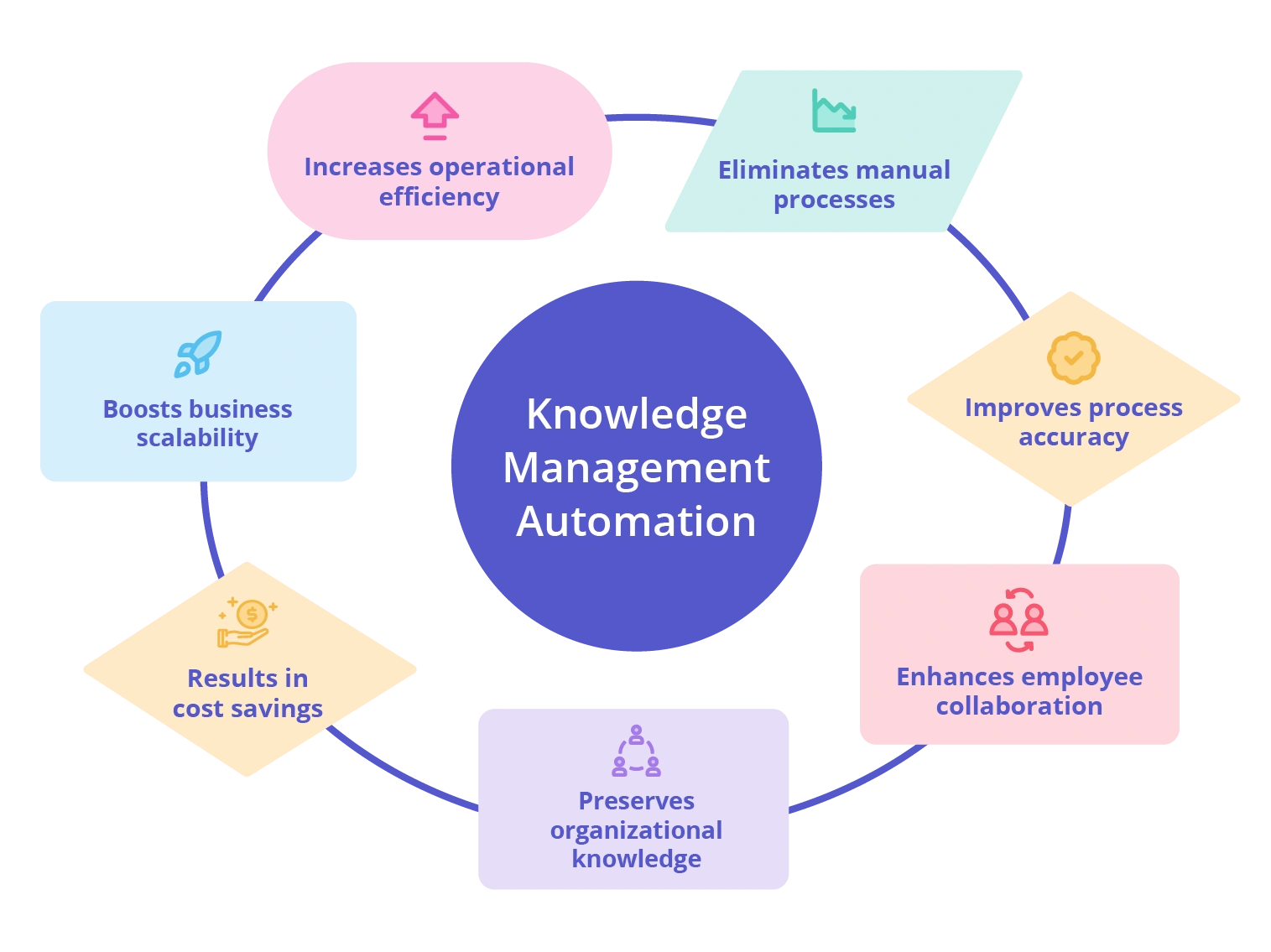Knowledge management automation integrates advanced technologies to streamline and optimize the process of capturing, distributing, and effectively using knowledge within an organization. This concept represents a significant leap from traditional knowledge management practices, which often relied heavily on manual processes.
With over 50% of executives stating it takes employees longer than 10 minutes to locate or access the information they need to complete an engagement or transaction, knowledge management automation becomes essential for businesses to enhance their ability to manage vast amounts of information more efficiently, leading to improved productivity, faster decision-making, and a more agile organizational structure.
What is knowledge management automation?
Knowledge management automation involves the use of technologies such as robotic process automation (RPA), artificial intelligence (AI), machine learning, and natural language processing (NLP) to automate the collection, categorization, and dissemination of information.
These technologies enable systems to learn from data, identify patterns, and make intelligent decisions, thereby reducing the reliance on human intervention and minimizing the possibility of errors. This automation accelerates the flow of information and ensures that the knowledge is accurate, up-to-date, and readily accessible to those who need it. However, businesses must ensure they have a solid knowledge governance strategy and framework in place before implementing automation.
Knowledge management automation is a powerful approach that can greatly enhance the efficiency and effectiveness of an organization's knowledge processes. By leveraging the right technologies, businesses can improve customer service, support better decision-making, and drive innovation across various sectors.
Why Is knowledge management automation important?
Knowledge management automation is essential for optimal business operations, transforming how organizations handle and utilize information. 55% of executives state difficulties in information and data quality and having to search across too many systems when providing necessary and timely information to employees. Knowledge management automation allows organizations to seamlessly integrate various information sources, reduce manual intervention, and ensure that crucial data is readily accessible to those who need it.
Consider the real-life applications of knowledge management automation, particularly in large-scale businesses. These enterprises rely on vast amounts of data to maintain their competitive edge. For instance, they employ sophisticated knowledge management systems to optimize their supply chain, customer service, and inventory management. By automating these processes, they can quickly respond to market demands, improve customer satisfaction, and reduce operational costs. Similarly, customer experience and contact center solutions leverage automated knowledge management to provide real-time information to support agents, enhancing their ability to resolve customer issues efficiently and accurately.
Knowledge management automation empowers businesses to harness the full potential of their informational assets, fostering an environment of continuous improvement and innovation. By implementing advanced knowledge management systems, companies can navigate the complexities of the modern business landscape with agility and confidence.
Examples of knowledge management automation in business operations
In today’s business operations, knowledge management automation is essential for enhancing efficiency and productivity, using advanced technologies to systematically organize, manage, and disseminate information within an organization. This automation streamlines various processes, reduces the likelihood of human error, and ensures that accurate and up-to-date information is readily accessible to those who need it.
Process automation
Process automation in knowledge management leverages robotic process automation (RPA) to automate routine tasks, such as data entry, document management, and process workflows.
By integrating these technologies, businesses can automate the capture, categorization, and retrieval of knowledge, ensuring that valuable information is consistently organized and easily accessible. This speeds up decision-making processes and frees employees to focus on more strategic activities. Additionally, process automation enhances data accuracy and compliance by minimizing manual intervention, leading to more reliable and efficient business operations.
Customer service automation
Businesses utilize automation to manage customer interactions across various channels. These technologies gather and analyze customer data in real-time, enabling businesses to deliver seamless and efficient customer service. By automating knowledge management processes and procedures they ensure that agents have immediate access to the most relevant and up-to-date information, allowing them to resolve customer inquiries more quickly and accurately. By automating knowledge management, these businesses can enhance customer satisfaction and loyalty, ultimately driving revenue growth.
Top 7 benefits of knowledge management automation
By automating businesses processes, companies can experience a multitude of benefits that significantly enhance operational efficiency, employee productivity, and customer satisfaction.

Increases operational efficiency
The ability to quickly access and utilize relevant information can be a critical differentiator. Automated knowledge management systems can swiftly collate and organize data from various sources, making it easier for employees to find the information they need without wasting time sifting through irrelevant content. This capability is particularly beneficial in large organizations where the volume of data can be overwhelming and time-consuming to manage manually. Additionally, automated systems can provide valuable insights through data analytics, helping businesses make informed decisions and stay ahead of the competition.
Eliminates manual processes
Automated knowledge management systems facilitate the quick and easy retrieval of information, eliminating the time-consuming task of manually searching through documents and databases. This acceleration in information retrieval boosts employee productivity and enables faster decision-making processes, which are crucial in a fast-paced business environment. For example, in large-scale organizations, automated knowledge management allows employees to swiftly access product information, customer data, and internal resources, thereby enhancing their capacity to respond to customer inquiries and resolve issues promptly.
Improves process accuracy and consistency
Increased accuracy and consistency of information are also notable benefits of knowledge management automation. Automated systems reduce the likelihood of human error in data entry and retrieval, ensuring that the information accessed by employees is accurate and up-to-date. This consistency is particularly important in industries where precise information is critical, such as finance, insurance, utilities, and retail. Customer service teams rely on accurate product and order information to address customer queries effectively, and any discrepancies can lead to customer dissatisfaction and potential loss of business.
Enhances employee collaboration
Knowledge management automation tools provide a centralized platform where employees can share and access information effortlessly. This centralization fosters a culture of collaboration, as team members can easily contribute to and benefit from shared knowledge. Companies that specialize in customer experience and contact center solutions leverage these tools to ensure that their teams are well-informed and can provide consistent and accurate information to clients. Additionally, companies with optimized knowledge-sharing solutions see a 20% reduction in time to proficiency for employees by fostering a culture of continuous learning and improvement.
Preserves organizational knowledge
Knowledge management automation contributes to the preservation and transfer of institutional knowledge. As employees come and go, there is a risk of losing valuable information and expertise. Automated systems ensure that critical knowledge is captured and stored systematically, making it accessible to current and future employees. This continuity of information is vital for maintaining business operations and nurturing a knowledgeable workforce.
Results in significant cost savings
Organizations that use automation can achieve up to 40% cost savings by reducing the need for extensive manual labor and minimizing the risk of human error. By reducing the time and resources spent on manual information management tasks, businesses can allocate their resources more efficiently. Automated systems minimize the need for physical storage space and reduce the costs associated with printing and distributing documents. Additionally, the enhanced efficiency and productivity gained through automation translate into cost savings, as employees can focus on more strategic and value-added activities. For businesses, reducing operational costs while maintaining a high level of service quality is crucial, and knowledge management automation plays a pivotal role in achieving this balance.
Boosts business scalability and adaptability
As businesses grow and evolve, their information management needs become more complex. Automated systems are designed to scale with the organization, accommodating the increasing volume and diversity of data. This scalability ensures that businesses can continue to operate efficiently and maintain high standards of information management as they expand. Companies that deal with large volumes of customer interactions and data benefit immensely from scalable knowledge management solutions that support their growth and adaptability in a competitive market.
By improving operational efficiency and productivity, enhancing collaboration, preserving institutional knowledge, ensuring accuracy and consistency, reducing costs, and providing scalability, automated knowledge management systems empower organizations to thrive in an increasingly complex and information-rich world. Many organizations, from large enterprises to small family-owned businesses, exemplify how leveraging these advanced technologies can lead to significant improvements in operational performance and customer satisfaction.
Moving forward with knowledge management automation in your organization
In today's rapidly advancing digital landscape, moving forward with knowledge management automation represents a shift in how businesses store, retrieve, and utilize information. This innovative approach integrates advanced technologies to streamline the management of knowledge, thereby enhancing efficiency, productivity, and decision-making processes. By automating routine tasks, organizations can free up valuable human resources to focus on strategic initiatives, ultimately driving growth and competitive advantage.
Knowledge management automation finds its applications in various real-life settings and business environments, reshaping how companies operate. For instance, in customer service, automated knowledge management systems can provide immediate and accurate responses to customer inquiries, improving satisfaction and loyalty. Businesses have leveraged these systems to manage vast amounts of data, ensuring that their operations remain seamless and customer experiences are consistently positive.
Explore our integrations page to learn more about how you can leverage knowledge management automation to simplify business processes by eliminating repetitive tasks and manual interventions across systems.



